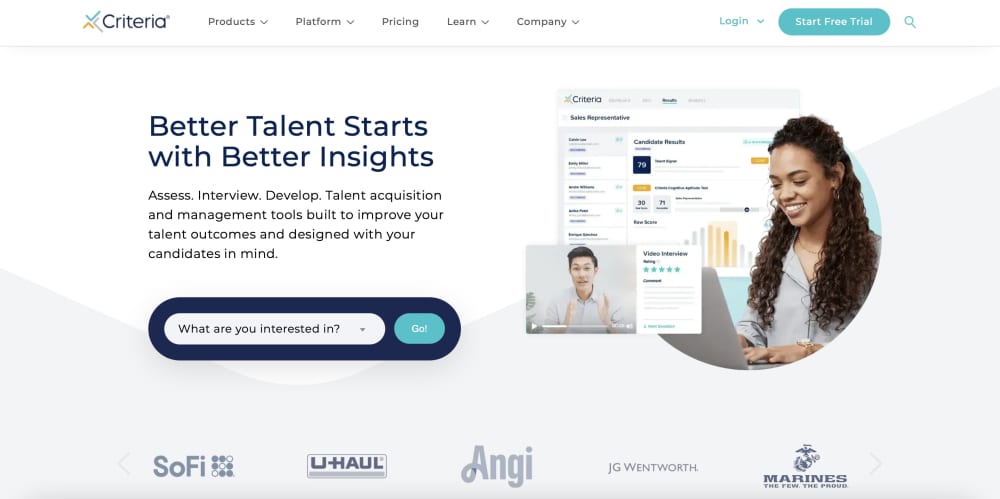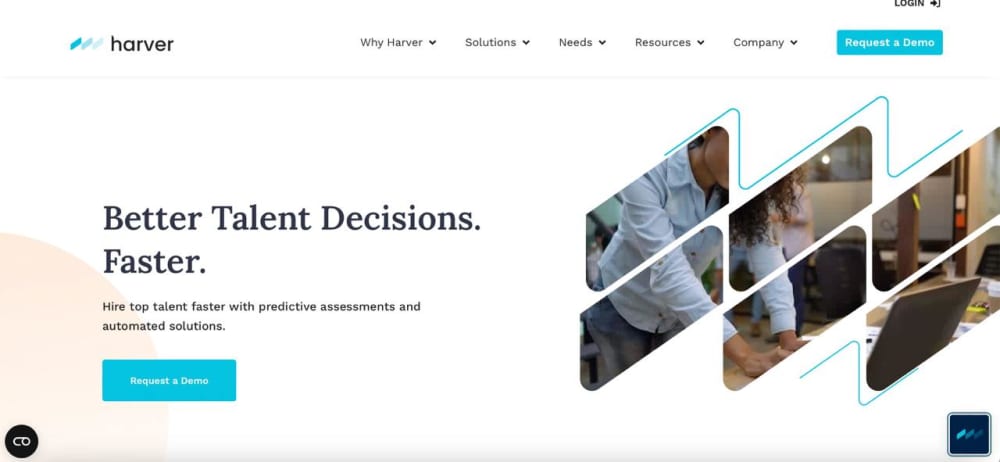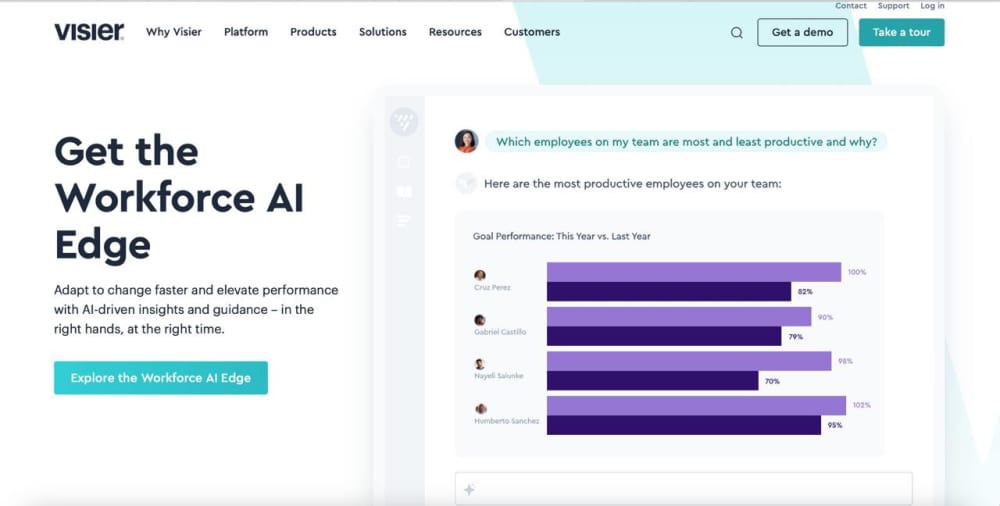The world is changing, as are its business processes. Human resources (HR) departments are also undergoing significant changes. As organizations strive to create a more efficient, productive, and engaged workforce, HR's role is becoming more strategic and technologically advanced. From recruitment and management to training and performance measurement, HR professionals increasingly rely on artificial intelligence (AI) to optimize operations, reduce costs, and stay competitive.
The numbers speak for themselves. AI was used the most in professional institutions in the US in 2024 during recruiting, interviewing, and hiring, where 64% of HR professionals said they used AI in their working tasks. GenAI, to be specific, has taken root in HR divisions, especially in roles such as creating content for advertisements and serving as chatbots for admin inquiries. According to the latest surveys conducted by Statista, 70% of the HR departments already utilize GenAI in these functions.
With AI tools capable of scanning resumes, identifying key skills, and even analyzing candidates' social networks for cultural fit, the recruiting process is faster and more data-driven than ever before. As new technologies are introduced, the impact of AI on HR is no longer a question of "if" but "how."
In this blog post, we'll explore AI's key benefits in HR, how it's being applied across functions, and examine the tools that are transforming the talent acquisition and management process.
Benefits of implementing AI in HR
Recruiting often requires significant time and resources, creating numerous challenges and unpredictable delays. From the very beginning of sourcing and screening candidates to conducting interviews and evaluating talent, recruiters must go through a complex process to determine who is the best fit for their organization. According to a SHRM survey, two out of three companies currently using AI for recruiting, interviewing, or hiring have implemented it within the last year, indicating a growing recognition of AI's potential to optimize these processes. So, what are the benefits of implementing AI in HR and recruiting?
1. Optimization of recruiting efficiency
Recruiters spend a great deal of time performing manual tasks such as screening applications, coordinating schedules, and managing communications with candidates. Artificial intelligence reduces this workload by analyzing and automating repetitive workflows - reviewing thousands of resumes in seconds, highlighting the best candidates, and even automatically scheduling interviews. By doing the heavy lifting, AI allows recruiters to focus on the things that really matter and can't be assessed or done by a machine: building relationships, assessing company culture fit, and checking the candidate against the company's vibe.
2. Reduced time to hire
Speed is everything in a competitive labor market. Sometimes, the best candidates are gone like hotcakes. Artificial intelligence allows companies to perform several stages of the hiring process in parallel - candidate search, selection, and even preliminary assessment. While a recruiter is interviewing one candidate, artificial intelligence can continue to search for new candidates in the background. This synchronization can reduce the hiring time by 50%, helping organizations find the best candidates before the competitors.
3. Enhanced candidate experience
Irregular communication, a long onboarding process and doubts about candidates' competence are the main bottlenecks in the recruitment process. Outstanding candidates can decline employment opportunities due to suboptimal recruitment processes. AI tools significantly improve this situation by offering quick feedback, 24/7 chat support, personalized job offers, and automatic status updates. This results in a smoother, more transparent process that increases candidate satisfaction and strengthens your employer brand.
4. Fostering inclusive hiring
Unconscious bias can undermine diversity and inclusion goals - even unintentionally. Almost half of HR managers admit to being influenced by unconscious bias in their hiring process. We are all human, and we all have our preferences. That's where AI comes in. When used responsibly, artificial intelligence can help counteract this by anonymizing candidate data and objectively evaluating candidates based on skills, experience, and professional aptitude rather than age, gender, ethnicity, or education. This ensures consistency and fairness in assessments, helping organizations attract a more diverse talent pool.
5. Improved quality of hiring
Bad hires are expensive. One wrong hiring decision can cost a company a lot of money, depending on the role and level. Artificial intelligence can help improve hiring decisions through data-driven insights and predictive models that assess candidates' potential, performance, and fit. Here, AI can analyze historical hiring data to identify patterns that led to success or failure in past hires to make smarter decisions and long-term hiring contracts in the future.
6. More cost-effectiveness
AI platforms can accomplish what would otherwise take hours of human labor in minutes. From candidate sourcing and background checks to onboarding, AI helps you optimize the use of resources (human and budget). It can even tell you where to focus your recruiting efforts - by looking at which job boards or channels attract the highest quality candidates - so you get the most out of each hiring campaign.
7. Strategic workforce planning
AI isn't just for hiring - it's also a strategic tool. With predictive analytics, HR teams can predict future staffing needs, identify skill gaps, and even anticipate the risk of employee turnover.
With this information, recruiters can proactively build a talent pool, develop succession plans, and stay one step ahead of organizational growth or change.
8. Personalized training and development
Once the right talent is hired, AI continues to deliver value by supporting individualized onboarding and professional development. It acts as a so-called virtual mentor for the candidate. AI tools can identify employee skill gaps, recommend personalized training programs, and track learning progress, creating a culture of continuous growth that fosters employee engagement and retention.
9. Improved employee experience and retention
Beyond recruitment, AI improves the entire employee lifecycle. By automating repetitive administrative work and simplifying access to internal services (such as payroll, HR forms, or leave requests), AI allows employees to focus on their core work. At the same time, personalized communication, proactive wellness programs, and customized career development options enhance the employee experience, which is key to retaining the best employees in the long run.
10. Competitive advantage
Firms that leverage AI in HR are more likely to be flexible, better informed, and more proactive. They can act faster, recruit better workers, reduce costs, and more effectively align talent management with business objectives.
Application of artificial intelligence in recruiting
Thanks to AI-based tools that are becoming more accessible and sophisticated, HR departments are growing and evolving at a lightning speed, optimizing all processes. Artificial intelligence is transforming the recruitment process to be more efficient and knowledgeable. Using AI, HR professionals can smooth every phase of the recruitment process, saving time and cutting costs. Let's take a look at how AI can be used throughout the entire employee lifecycle and what it brings to each stage of the employee experience:
Recruitment and candidate search
AI-powered tools can help HR departments search more effectively on job boards, social media, and internal databases. Employing machine learning to identify the most suitable candidates speeds up and makes the process more precise. AI can also automate resume screening, sorting candidates by qualification and experience, with chatbots handling initial contact and assessing basic skills. AI-based tests also provide valuable insights about a candidate's strengths, personality, and culture to make an informed decision.
By leveraging technology, the hiring process becomes more innovative and inclusive, and it can connect with candidates to enhance their experience and increase retention rates. The choice of recruitment platforms and apps is vibrant, so let's take a look at how the options stand out:
A good example is the IBM Watson app. It offers powerful artificial intelligence features designed to support HR functions such as recruitment, engagement, and workforce planning. IBM Watson supports HR professionals by automating resume screening, candidate assessment, and predictive analytics for employee engagement. Powered by data, IBM Watson enables HR teams to make better, more data-driven hiring decisions.
Modern hiring platforms such as SeekOut and hireEZ combine artificial intelligence with human insight to simplify and improve the hiring process. These applications make it easy to find candidates based on specific requirements, such as medical licenses, security clearances, or skills in highly specialized technologies. These tools integrate with HR systems to help identify skills gaps, improve diversity, and make informed investments in your workforce. HireEZ uses agent-based AI to go beyond automation, increasing productivity through more innovative candidate matching, automated sourcing, and seamless collaboration between teams.
platforms like Beamery help organizations manage the entire employee lifecycle—from attracting and hiring candidates to developing and retaining employees. Through its talent acquisition tools, Beamery aids in sourcing and matching candidates effectively. Its AI capabilities help in assessing and selecting the right candidates based on skills and potential.

Сandidate selection
Candidate selection is an essential but time-consuming step in the hiring process, especially when you have a large number of applications to process. AI-powered tools can help simplify this stage by quickly analyzing resumes and extracting key information to help shortlist the most suitable candidates. These tools reduce the time spent on manual screening and efficiently bring the best candidates to the forefront.
Conversational AI and chatbots can also support the initial screening process by automatically filtering candidates based on essential criteria such as age, work permits, and driver's licenses. More advanced systems go further by assessing behavioral patterns, personality traits, and specific skills to help identify candidates.
AI candidate selection tools rely on various methods, including resume analysis, skills assessment, and predictive analytics. Criteria Corp offers scientifically based assessments that measure skills, cognitive abilities, and personality traits. It helps to predict performance and cultural fit in various industries. A similar app, eSkill, is more broadly focused and provides customizable skills tests and simulations for a wide range of industries and job roles.

Interviewing applicants
An interview is the first step in becoming familiar with an applicant face-to-face. Thanksto AI platforms, businesses can hold initial interviews through video or chat, where applicants' responses are recorded and processed to determine their fit.
AI can review transcripts and resumes, so presenting findings to hiring teams is easy. Accurate transcripts and reminders eliminate the need to rely on memory or impression, enabling more objective and well-informed hiring choices.
HireVue delivers efficiency and objectivity with its AI-powered video interview platform. It allows candidates to be interviewed on-demand or live while AI assesses communication skills, cultural fit, and job fit. Real-time tools, shareable recordings, and structured interview guides help hiring teams work faster and make better decisions.
Symphony, a conversational AI agent, goes further by automating candidate screening, live interviews, and onboarding simulations. Targeting customer-facing roles, it assesses emotional intelligence and soft skills, helping recruiters reduce bias and shorten the time to hire.
Meanwhile, Sapia.ai offers an AI-powered chat and voice interview solution that turns job descriptions into structured competency-based assessments. Each candidate receives an objective evaluation of 25+ soft skills and is matched to the job requirements. Sapia automates everything from the initial interview to shortlisting and scheduling final rounds, making the hiring process faster and fairer.
Platforms such as Calendly and Clara make scheduling easier by eliminating the need for emails. Calendly allows users to instantly share their schedule and book meetings, while Clara is a virtual assistant built into your email. Clara will manage scheduling, tracking, and communicating naturally, like a human, 24 hours a day, 7 days a week. This app integrates with the HR-system to confirm appointments, update calendars, and automate processes.

New employee onboarding
Onboarding is a decisive process that determines the new employee's first impression of the firm and sets the tone for further collaboration. AI solutions are revolutionizing the process by automating routine tasks, offering real-time assistance, and creating personalized onboarding situations for each recruit.
AI automates administrative tasks like document processing, compliance training, and scheduling, allowing HR teams to devote more time to strategic functions. Chatbots respond in real time by answering basic questions regarding the policies of the company, benefits, and responsibilities - day or night. Additionally, AI tailors the process of adaptation so that each worker can learn at their own pace and focus on what best fits their job. Enboarder, one of the leading AI-based onboarding platforms that empower HR teams to provide interactive, personalized, and scalable experiences for new hires, is an effective tool in this context.

Learning and development
Artificial intelligence transforms learning and development by identifying skills gaps, personalizing learning, and supporting continuous professional development. AI-powered tools help HR teams develop more effective training programs tailored to individual needs, tracking real-time performance. Harver uses neuroscience-based, game-style assessments to evaluate candidates' cognitive and emotional traits. This helps HR match people to roles where they will thrive, reduce bias, support long-term development, and design further training programs based on this.
Another great tool is Cornerstone, which uses artificial intelligence to personalize learning, upskill employees, and close compliance gaps. Cornerstone recommends targeted training based on employee skills and goals, helping to improve retention, mobility, and productivity. Coassemble, on the other hand, makes it easy to create engaging courses and quizzes using artificial intelligence. These platforms help teams stay smart and future-ready by keeping abreast of all trends and market needs.

Employee Analytics, Planning, and Engagement
Beyond recruitment and onboarding, AI is transforming how HR teams plan, measure, and nurture their workforce. With advanced people analytics, planning and engagement tools, organizations can gain deep insights into their teams, predict potential risks like turnover, and optimize strategic decisions about hiring, promotion, and development.
Visier offers advanced people analytics that simplifies the HR decision-making process. Its AI-powered assistant, Vee, provides instant answers to HR questions, allowing teams to focus on strategic work. Integrated with platforms such as Microsoft Teams, Vee offers secure, real-time access to information, helping companies scale their impact with confidence.
Lattice is another employee performance and engagement platform that uses AI-powered insights to help companies track growth, increase satisfaction, and build high-performing teams. With tools for performance measurement, career development, and goal setting, Lattice supports HR teams with on-demand training, expert-led events, and an active HR community.

Сonclusion
Artificial intelligence transforms human resources management by introducing powerful tools that optimize work and improve decision-making. AI-powered recruitment platforms, workforce management systems, performance measurement tools, and predictive analytics enable HR teams to optimize candidate sourcing, workforce planning, and performance tracking with greater accuracy and efficiency. These technologies reduce the burden of repetitive tasks, allowing HR professionals to focus on strategic initiatives that drive organizational growth and employee engagement. In short, AI doesn't replace recruiters - it empowers them. When used carefully and under supervision, it gives assistive care professionals the ability to act more strategically, deepen human connections, and deliver measurable value to their organization.